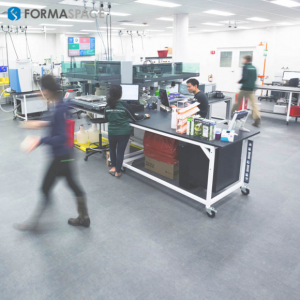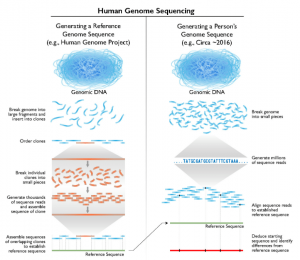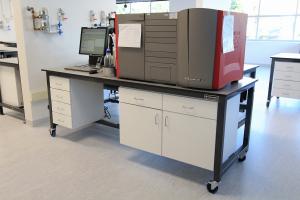Lower-cost Genomic Sequencing Machines to Help Make Personalized Medicine a Reality

Formaspace builds custom laboratory furniture in the USA at our Austin, Texas, factory headquarters. Shown above are Formaspace lab workbenches in use at Ginkgo Bioworks.
Find out how reduced costs could expand the use of genomic sequencing in research and clinical testing laboratories.
Illumina Introduces A New Lower-Cost $200 Genome Sequencing Solution At Its Inaugural Illumina Genomics Forum
In September 2022, Illumina introduced its new line of genomic sequencing machines – the NovaSeq X, NovaSeq X Plus, and the FDA-registered NovaSeq 6000 Dx – at a new event hosted in the company’s hometown of San Diego.
The NovaSeq X product has created the biggest splash in the press, as Illumina claims it can deliver a full genomic sequence for as little as $200. Of course, this headline is a bit misleading – the machine alone costs $985,000, and the supporting reagents are extra, but Illumina maintains that users of the new refrigerator-sized NovaSeq X machines can achieve the average target price of $200 per genome when sequencing at large scale volumes.
According to Illumina, the NovaSeq X series is designed to handle higher volume production: the NovaSeq X Plus can sequence over 20,000 whole genomes per year, a 2.5 X throughput increase compared to earlier generation sequencers.
Among the welcome new efficiency features, Illumina says the new sequencers can use reagents that can be shipped at ambient temperatures, eliminating the extra cost and complexity of packaging chemicals in dry ice or ice packs.
While there are questions about whether most laboratories will perform enough tests to achieve the claimed $200 genome cost benchmark, these new machines do represent a significant milestone in reducing the cost of genomic sequencing.
The big game changer came in 2007 with the commercial introduction of high-throughput next-generation sequencing (NGS) technologies, which drove the cost of sequencing far below what Moore’s law would have predicted.
Complete Genomics—A Subsidiary Of Chinese-Owned BGI’s American Business Unit MGI – Launches A $100 Genomic Sequencing Solution
Why is Illumina dropping prices now?
Most analysts point to increased competition from arch-rival, China-based BGI (formerly Beijing Genomics Institute) and its American subsidiary, San Jose-based Complete Genomics (which BGI acquired in 2013 and merged into its instruments manufacturing business unit MGI).
In February 2023, Complete Genomics introduced a new line of high throughput genomic sequencers at the Advances in Genome Biology and Technology (AGBT) conference.
Like Illumina, they are focused on reducing the cost of sequencing operations. Complete Genomics claims that – thanks to new efficiencies (such as running 6 tests in parallel) and significantly lower reagent costs – the new machines sequence a human genome for as little as $100.
The company maintains that the new DNBSeq-T20x2 platform can produce 22 terabytes of data per day, equivalent to sequencing 50,000 whole human genomes (at 30x coverage) per year.
The DNBSEQ class machines are based on the DNA NanoBalls (DNB) sequencing technology which Complete Genomics first introduced in 2008. This approach cleaves off small genetic base pair fragments, forming them into circular DNA nanoballs, which are then image processed through a sequencing flow cell using a patented DNA co-barcoding technology.
Other Illumina Business Rivals Could Threaten Its Business With Lower-Cost Genetic Sequence Solutions Based On Novel Technologies.
Illumina is also likely reducing prices in reaction to potential threats to its market share from new, lower-cost genomic sequencing technologies developed by its rivals, including Pacific Biosciences (which Illumina tried to purchase in 2021 but was blocked by the FTC) as well as Oxford Nanopore Technology, Quantapore, and Stratos.
Pacific Biosciences (also known as PacBio) specializes in “long read” genetic sequences, a capability that was missing in Illumina’s portfolio. PacBio also commercialized the single-molecule real-time (SMRT) sequencing method in 2011 that allows single DNA molecules to be processed in real-time.
Read more...
Julia Solodovnikova
Formaspace
+1 800-251-1505
mktg@formaspace.com
Visit us on social media:
Facebook
Twitter
LinkedIn
Legal Disclaimer:
EIN Presswire provides this news content "as is" without warranty of any kind. We do not accept any responsibility or liability for the accuracy, content, images, videos, licenses, completeness, legality, or reliability of the information contained in this article. If you have any complaints or copyright issues related to this article, kindly contact the author above.


